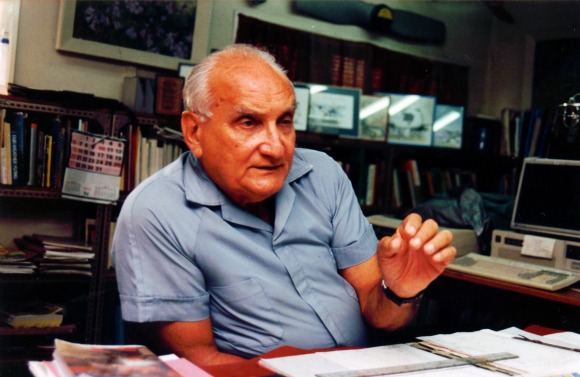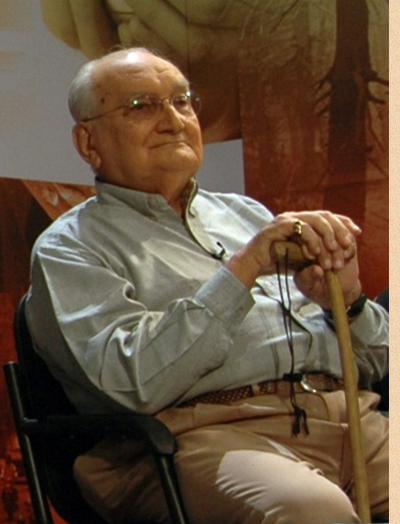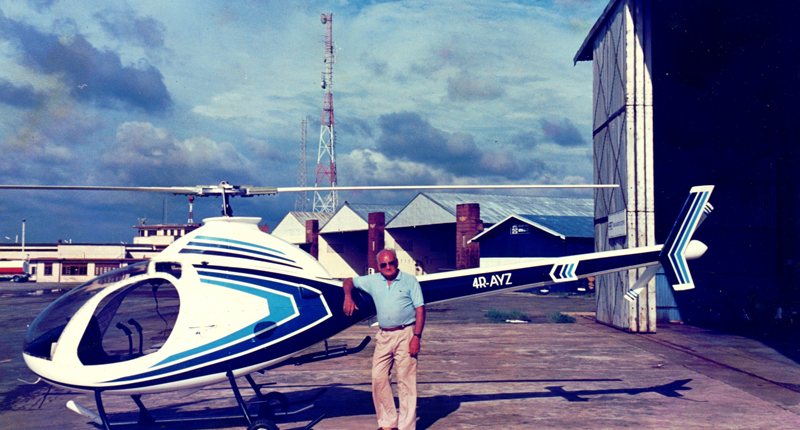Biography: A Man for all elements
 |
Philip Revatha (Ray) Wijewardene was born in Colombo, Ceylon, on 20 August 1924. He had his primary and secondary education at Ladies’ College, Colombo, and St Thomas’ College Mount Lavinia. He proceeded to Peterhouse College, Cambridge University, UK, where he studied three branches of engineering -- aeronautical, mechanical and agricultural. He also earned qualifications in business administration from the Harvard Business School, and later received honorary degrees from universities in the UK and Sri Lanka.
With a deep interest for all things mechanical, Ray studied and experimented with both agricultural machinery and aeroplanes. These twin passions were to last a lifetime. He was fond of saying, "Agriculture is my bread and butter, while aviation is the jam on top of it”.
In 1955, Ray designed the world’s first two-wheeled, hand tractor to help small farmers in the tropics to mechanise their work. It was soon mass produced by Landmaster company in Nottingham, UK. During the 1960s, Ray travelled all over Asia, Africa and Latin America promoting the tractor to farmers and governments.
A turning point came in 1964, when he presented his Landmaster experience to a class in agri-business at the Harvard Business School. Buckminster Fuller, the noted American architect, designer and inventor, asked from the audience: “Did your tractor mechanise tropical farming - or just the buffalo?”
That question triggered a complete reorientation in Ray’s thinking. He later acknowledged: “Ultimately, the tractor only mechanised the buffalo, and that too, not very well. It didn’t have the reproductive capability of the buffalo! Nor could it produce milk as the buffalo did, or fertilise our fields!”
 Associating Fuller influenced Ray’s thinking not only on tropical farming, but also on appropriate use of science and technology to meet other development needs. He questioned a fundamental premise of the Green Revolution. “All along, its promoters focused on maximising yields through massive (external) inputs. But they forgot that what the farmer wants is to maximize profits, not necessarily yields!”
Associating Fuller influenced Ray’s thinking not only on tropical farming, but also on appropriate use of science and technology to meet other development needs. He questioned a fundamental premise of the Green Revolution. “All along, its promoters focused on maximising yields through massive (external) inputs. But they forgot that what the farmer wants is to maximize profits, not necessarily yields!”
Ray dedicated the rest of his life to researching and promoting ecologically sustainable agriculture, and later, renewable energy technologies. As a world authority on tropical farming systems, Ray worked for the UN Food and Agriculture Organisation (FAO) in the early 1970s as Head of Agricultural Engineering at the Mechanization and Automation Research Centre (MARDI), in Kuala Lumpur, Malaysia. He then spent nearly five years as Head of Agricultural Engineering and Research at the International Institute of Tropical Agriculture (IITA) in Ibadan, Nigeria.
During this time, he pursued a large number of improvements and innovations to help small farmers in the developing world to grow more food without high external inputs. In particular, he promoted a technique called Sloping Agricultural Land Technology (SALT), originally developed in the Philippines. This involved terracing of land, use of leaf mulch, and re-introducing perennial trees into rain-fed farming.
Returning to Sri Lanka in 1980, he continued experimenting with rain-fed farming and agro-forestry on his coconut estate in Kakkapalliya, in the North-western Province. He also did field tests for dendro thermal power, the generation of electricity from firewood. This technology is now increasingly being used by industry. He also introduced inter-cropping gliricidia with coconut, vastly increasing coconut yields.
For decades, Ray worked closely with Sri Lanka’s business, research and policy communities. He held various appointments as Chairman of the Tea Research Board, head of the Inventors Commission and a member of several public sector bodies concerned with agriculture, science and technology. He was Chancellor of the University of Moratuwa from 2002 to 2007. The government of Sri Lanka awarded him the highest national honours of Vidya Jyothi (Luminary of Science) and Deshamanya (Pride of the Nation) for distinguished public service.
Ray was an outstanding sportsman who excelled in water sports. A long-standing member of both the Colombo Rowing Club and the Ceylon Motor Yacht Club, he represented his country in international competitive sailing events. He competed in the Mexico Olympics in 1968, and won a Silver medal at the Asian Games in Bangkok in 1970.
As an aviator, he held pilot license to fly fixed-wing aircraft, helicopters and autogyros. He experimented with building and flying ultra-light aircraft and helicopters, and trained a generation of pilots and aircraft technicians.
Ray was also an accomplished violinist and oil painter.


